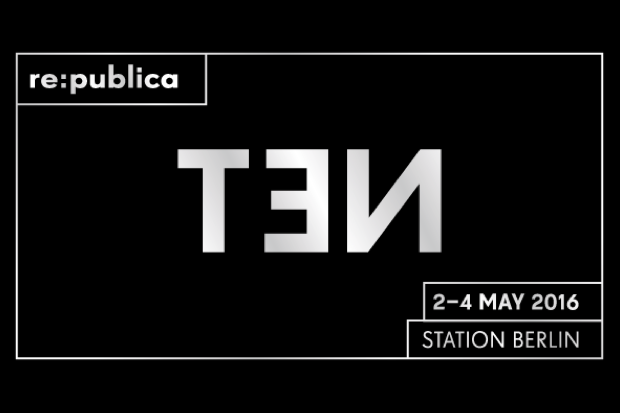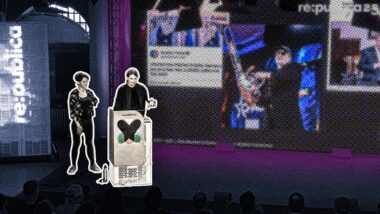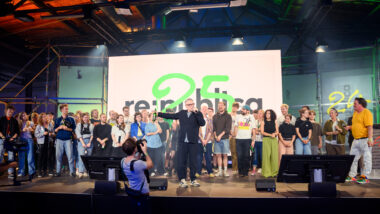Die re:publica ist eine der weltweit wichtigsten Veranstaltungen rund um Themen der digitalen Gesellschaft. Dieses Jahr feiert die Konferenz vom 2. – 4. Mai in Berlin ihren zehnten Geburtstag mit über 750 Sprecherinnen und Sprechern aus vielen Ländern auf 17 Bühnen. Unsere Redaktion ist auch mit einem kleinen Stand vertreten und freut sich über Besuch.
Tickets für die kommende re:publica gibt es noch hier zu kaufen.
Wir haben uns das Programm für Euch genauer angeschaut und präsentieren im Folgenden eine netzpolitische Empfehlung zu den aus unserer Sicht interessantesten Beiträgen des dritten Tages. Wie immer gilt: Das ist nur ein Auszug aus dem Programm, es gibt insgesamt fast 400 Stunden Programm in den drei Tagen. Und wahrscheinlich haben wir noch einige netzpolitisch-relevante Veranstaltungen übersehen. Wer es nicht schafft vor Ort zu sein, kann die Veranstaltungen der Bühne 1 im Live-Stream verfolgen. Die Vorträge und Diskussionen auf einigen anderen Bühnen werden spätestens nach drei Tagen auf dem re:publica YouTube-Channel hochgeladen.
(Hier könnt ihr unsere Empfehlungen für Tag 1 und Tag 2 lesen.)
Veranstaltungs-Empfehlungen Tag 3:
10:00-11:00 | Stage 2 | A. Semsrott, F. Krakenbürger, J. Kloiber
Die jährliche Ansprache zur aktuellen Lage der Offenheit und Transparenz im deutschsprachigen Raum. Wir berichten zu den aktuellen Entwicklungen rund um Open Data, Transparenz und Open Gov. Wir nehmen Stellung zu den Erfolgen, Fails und irritierendsten Anfragen. (Weitere Infos)
10:00-10:30 | Stage 6 | Rikke Frank Joergensen
Online platforms play an increasingly important role as owners and managers of the online infrastructure and sociability. As such, they have the power to influence users’ human rights in ways conventionally reserved for governments. The presentation will identify and discuss challenges related to human rights protection in privately governed spaces. In conclusion, it will argue that current responses are insufficient and new policy responses urgently needed. (Weitere Infos)
10:00-11:00 | Stage T | Adrian Schneider
Das Internet lebt von seinen Inhalten. Deshalb prägt kein Rechtsgebiet das Netz so sehr wie das Urheberrecht. E-Mails, Instagram-Posts, Videos auf Youtube – so gut wie alles, was wir täglich kommunizieren oder konsumieren kann urheberrechtlich geschützt sein. Urheberrecht sollte deshalb kein Nischenwissen, sondern Allgemeinbildung sein. Die Basics des Urheberrechts sollen in dieser Session, einfach, verständlich und unterhaltsam erklärt werden. (Weitere Infos)
10:30-11:00 | Stage 6 | Jan-Peter Kleinhans
How law enforcement agencies (LEA) get access to user data from service providers like Google, Facebook or Microsoft is poorly regulated. Established legal frameworks (Mutual Legal Assistance) are severely outdated and do not adequately protect our human rights. LEA investigations in the cloud are a messy business and currently dominated by pragmatism rather than the rule of law. The talk will highlight issues of the current practices and give an overview over the international reform debate. (Weitere Infos)
11:15-11:45 | Stage 1 | Hossein Derrakhshan
Der iranische Blogger Hossein Derrakhshan sass sechs Jahre im Gefängnis. Als er raus kam, war das Netz ein anderes: The demise of hyperlink was caused by the social media and mobile applications. How is this shaping the future of the internet and what is its impact on our societies? (Weitere Infos)
11:15-12:15 | Stage 6 | N. Heise, K. Boudreau, R. Panter, T. Busch
Racism, sexism, trolling, flaming, griefing and other kinds of toxic behavior seem to dominate headlines about social media and digital games today. From both theoretical and practical perspectives, this 60-minute panel will discuss the crucial role of community management and a communication culture driven by ethics, empathy, dialogue and responsibility when it comes to governing toxic behavior online. After short inputs by each panelist, we will open the floor for questions from the audience. (Weitere Infos)
11:15-11:45 | Lightning Talks 2 | Christoph Deeg
Das Thema Gaming beschäftigt uns schon seit einigen Jahren. Eine Institution, welche dabei oft übersehen wird, sind die öffentlichen Bibliotheken. Dabei entstehen dort gerade u.a. mittels Gaming völlig neue Kultur- und Lernorte. In meiner Session möchte ich beschreiben, was in öffentlichen Bibliotheken im Bereich Gaming gerade passiert, wie daraus resultierend neue Formen der Kultur- und Wissensvermittlung ermöglicht werden und wie wir diesen Prozess aktiv mitgestalten können. (Weitere Infos)
11:45-12:15 | Stage 3 | Stefan Kaufmann
Vor einem Jahr sah es noch aus, als würden ÖPNV und Deutsche Bahn im immer selben gestrigen Trott stecken bleiben – und links und rechts von Uber und sonstigen „disruptiven“ Diensten überholt werden. Seitdem hat sich jedoch viel getan: Immer mehr Verbünde und Verkehrsunternehmen veröffentlichen Fahrpläne als offene Datensätze, und selbst die alte, träge Deutsche Bahn hat sich Open Data auf die Fahnen geschrieben. Wir zeigen, wie du mithelfen kannst, diesen Prozess voranzutreiben. (Weitere Infos)
11:45-12:15 | Stage 8 | L. S. Dornheim, C. Cabulea, J. Kloiber
Wie wir es geschafft haben Antragsbürokratie zu reduzieren und Scheitern als festen Bestandteil von Innovation zu etablieren. Civic-Tech Projektideen von Einzelpersonen oder kleinen Gruppen haben es in Deutschland sehr schwer an eine finanzielle Förderung für die Umsetzung ihrer Idee zu kommen. Challenge accepted! Gemeinsam mit dem Bundesministerium für Bildung und Forschung (BMBF) haben wir deshalb einen Protoypen für ein Förderprogramm entwickelt, das innovative Tech-Projekte schnell und unbürokratisch finanziell unterstützt. (Weitere Infos)
12:30-13:00 | Stage 2 | Eric Jarosinski
Zur zehnten re:publica blicke ich auf meinen Werdegang von ahnungslosem Neuling in der Welt der sozialen Medien zum ahnungslosen „Twitter-Gott“ zurück und teile die zehn wichtigsten Einsichten aus dieser Erfahrung. (Weitere Infos)
12:30-13:00 | Stage 3 | M.C. Mcgrath, N. Colvin
To end limitless surveillance programs, we must understand how they begin. This talk uses open source intelligence and close readings of legislation and legal documents to understand the origins of the modern intelligence community and major cultural shifts that shaped it. We trace these trends from the rise of counterextremism ideology used to rationalize mass surveillance programs to the intelligence community’s response (and lack thereof) to the Snowden revelations. (Weitere Infos)
12:30-13:30 | Stage 5 | J. Kleske, A. Kocsis, A. Dewes
„Big Data“ ist die eine Seite der Medaille, deren andere Seite „Modelling“ heißt. Während gesammelte Datensätze vor allem rückblickend analysiert werden, werden die Ergebnisse dieser Analysen dazu genutzt, Prozesse zu optimieren und Entwicklungen vorauszusagen. Diese Metrik kann auch auf Arbeitnehmer angewendet werden. Wir fragen nach der „Arbeit der Zukunft“ in einem Zwischenschritt zur allgegenwärtigen Diskussion WARUM es überhaupt dazu kommen könnte, Kollegen durch Roboter zu ersetzen. (Weitere Infos)
13:00-13:30 | Stage 2 | J. Zimmermann, E. King
Hacking with Care is born from the magical encounter of Emily King, a massage artist, Jérémie Zimmermann, an internet activist, and friends with common good at heart. The collective explores well-being and care as components of hacking and activism, while also seeking to liberate care, and to inspire alliances between „caregivers“ of different competences. (Weitere Infos)
13:45-14:45 | Stage 2 | V. Grassmuck, K. Passig, L. Dobusch, M. Meisel
Die Bewegungen des Freien Wissens haben ein schwieriges Verhältnis zu formalen Organisationen, zu ihren eigenen und zu denen der öffentlichen Hand. (Weitere Infos)
13:45-14-45 | Stage 5 | A. Gupta, J. Gibson, P. Schulte
What is the real impact of military and policing drones, and what is the way forward? This workshop will aim to go beyond drones‘ effect on the right to privacy and examine the impact felt on the ground, by examining the arguments for and against the use of drones, sharing the experience of people who already live under them, the precedents that are being set through these practices, and the safeguards we need to set. (Weitere Infos)
13:45-14:15 | Stage 6 | Ingrid Brodnig
Die Psychologie hinter Fakes: Wie wütende User und obskure Blogs Unsinn im Netz verbreiten, wieso dies so wirkungsvoll ist und was wir dagegen tun können. (Weitere Infos)
13:45-14:45 | Stage 8 | B. Moshkovits, A. Bauer
Nation states struggle to maintain political, economical and social equilibrium, in the face of global crises. The system of modern democratic governance is based on ideas of the late 17th century, formulated by John Locke and Baron de Montesquieu and cannot survive in the current form. Almost 400 years later, our society has evolved, but our constitutions haven’t. How can the peer-to-peer based Blockchain algorithm help create new and more reliable forms of governance? How do we get from BitCoin to BitNation? (Weitere Infos)
13:45-14:45 | Stage J | Md Mahmudul Haque Munshi
This presentation aims to identify the application of freedom of expression on religion as the core-point of tension between radical Islam and its philosophical, political and religious opponents through the current political and social events and real-life experience of the endangered bloggers and activists of Bangladesh. (Weitere Infos)
15:00-16:00 | Stage 1 | Eleanor Saitta
Participation and security are both emergent properties of whole systems. Both properties are closely related and critical for understanding or building tools for humans. (Weitere Infos)
15:00-15:30 | Stage 2 | L. Dencik, A. Hintz
What have been the implications of the Snowden leaks almost 3 years on? How has regulation around surveillance developed and what have been the technological responses? What has been the nature of public debate on the topic? And how do concerns with mass surveillance relate to broader questions of social and economic justice? Based on an 18-month research project into the implications of the Snowden leaks for policy, technology, civil society and news media, this presentation will discuss some of these questions and reflect on what this means for the meanings and practices of citizenship today. (Weitere Infos)
15:00-16:00 | Stage 8 | A. Alberts, C. Le Guen
Public budgets are not the most beloved or attractive topic in the political arena, numbers can be daunting and budget data seems dry. But the budget is the document that decides what the governments is going to spend on all our beloved issues. So we need to understand how the budget works. In this session we give you an introduction in how to read the budget, budget processes, budget data and how to use budget data in reporting and advocacy. (Weitere Infos)
15:00-16:00 | Stage T | Fukami, K. Fiedler
The talk is going to dig deeper into the functioning of the European Union to help to make people understand what the EU actually is and what European citizens have to do with it. (Weitere Infos)
15:00-15:30 | Lightning Talks 1 | Mareike Foecking
Im Whole Earth Catalogue wurden Tools vorgestellt, die die Protagonisten der Counterculture, aus der sich später die Cyberculture entwickelte, zur Gestaltung neuer Lebensentwürfe befähigen sollten. Die Idee der Counterculture, alternative Lebensentwürfe anhand der im Catalogue angebotenen Bücher erfinden zu können, ist zur Realität und Zukunftsperspektive einer durchorganisierten, vorgedachten Welt geworden. Eine Analyse anhand von Bildern mit der Frage, wie eine neue Counterculture aussehen könnte? (Weitere Infos)
15:30-16:00 | Stage 2 | Andres Guadamuz
Smart programmes can take an image and process it in manners that resemble biological networks, resulting in unique and often unpredictable art. Copyright law has been drafted to consider originality as an embodiment of the author’s personality, which is one of the main requirements for the subsistence of copyright. So, what happens when you remove personality from the equation? Are machine-created works devoid of copyright? Do we need to change copyright law to accommodate autonomous artists? (Weitere Infos)
15:30-16:00 | Lightning Talks 1 | Ellen Dr. Euler
Im Oktober 2012 wurde auf europäischer Ebene eine Richtlinie über die Online-Nutzung verwaister Werke verabschiedet. Diese hatte zum Ziel das schwarze Loch des 20. Jhds zu stopfen und die in den Kultureinrichtungen und insbesondere deren Depots schlummernden Kulturschätze einer breiten Öffentlichkeit zugänglich zu machen. Insbesondere über die Deutsche Digitale Bibliothek und Europeana. In der Praxis haben die Regelungen zu den sogenannten verwaisten Werken leider nur wenig bewirkt. (Weitere Infos)
16:15-17:15 | Stage 2 | S. Stoltenow, M. Seyffarth, T. Wiegold, N. El-Hassan, F. Bouamar
Der selbsternannte Islamische Staat (IS) hat für seine Propaganda auf einzigartige Weise Terroraktivitäten mit Popkultur verwoben. Die Terrororganisation kontrolliert die Berichterstattung aus den von ihr beherrschten Gebieten und spricht gleichzeitig unsere Sensationslust an, um Angst, Panik und Misstrauen zu verbreiten. Um dieser Terrorlogik etwas entgegenzusetzen, brauchen wir mehr Sachlichkeit und Humor, sowohl in der arabischen Welt als auch bei uns. (Weitere Infos)
16:15-17:15 | Stage 4 | K. M Mubaiwa, J. C. Lara, C. Berger, N. Sambuli, L. Gimpel
The Good, the Bad and the Zero: This panel will explore different examples of zero-rated services across the world, looking into potential products of public interest as well as so-called walled gardens. Featuring speakers from Zimbabwe, Kenya, Chile and the EU, we will compare different regulations and patterns of investment trying to depict and identify strategies of how to increase access without undermining the free and open nature of the Internet which must be governed by human rights. (Weitere Infos)
16:15-16:45 | Stage 6 | Christion Römer
Dass die Rechtspopulisten das Internet als perfekte Propagandamaschine entdeckt haben war bekannt. Dass sie dabei auch linke Subkulturen schamlos vereinnahmen dagegen weniger. Politische Kommunikation von links huldigt stets dem Original, die Rechten sind dagegen Freunde der Kopie. Es wird geklaut, gecovert und gesampelt, was das Zeug hält. Die wahre Meisterschaft aber ist der gelungene Remix. Das Meisterstück: Den Kandidaten in die Kampagne kopieren. Der Vortrag analysiert die Netzmethoden der FPÖ in der politischen Kommunikation. Recht auf Remix, ja bitte. Remix von Rechts, nein Danke. Alle Film – und Tonbeispiele sind garantiert geklaut. (Weitere Infos)
16:15-16:45 | Lightning Talks 2 | Katharina Zweig
A free society needs transparency and accountability of automated processes (algorithms) that change our daily life rapidly: What mechanisms are needed to avoid irreversible situations, created by corporations and governments, that are hostile to democratic societies? How can time economic innovation be fostered? In summary: What theory and practice should emanate from the utopian promise that automation holds? We will present an initiative to host this discussion in a democratic manner. (Weitere Infos)
17:30-18:30 | Stage 1 | Mark Surman
These are dark days for the web. Monopolies, walled gardens, surveillance and fear have spread across the internet. On the flip side, there is a new wave of open emerging: a grassroots movement for online freedom, creativity and opportunity for all. (Weitere Infos)
17:30-18:30 | Stage 2 | A. Sander, V. Tripp, G. De Bastion, K. Fiedler
Vor fünf Jahren wurde auf der re:publica’11 der Digitale Gesellschaft e.V. als Verein für den Schutz der Menschenrechte im digitalen Raum gegründet. Seitdem ist viel passiert. Bei dem Netzpolitischen Abend auf der #rpTEN stellen wir uns, unsere aktuellen Kampagnen und Themen, an denen wir arbeiten, vor. (Weitere Infos)
17:30-18:30 | Stage 5 | C. Breuer, A. Meiritz, J. Braun, P. Sitte, S. Borghorst, S. Reubold
Die Wahrheit ist nicht da draußen. Die Wahrheit schlummert in den Posteingängen des Bundestags. Da wo der Bürger sie täglich hinmailt. Und in dieser Session werden wir sie endlich ans Licht bringen. Mithilfe zahlreicher Bürgerbriefe enthüllen wir die kleinen und großen Skandale der Bundesrepublik: Was hat Schäuble mit seinen getreuen Schergen, den Schäublewern, in der Ukraine vor? Wie kommt man wirklich an ein Bundestagsmandat? Und möglicherweise wissen wir auch, wo das Bernsteinzimmer ist. (Weitere Infos)





Besteht denn die Möglichkeit, dass ihr die Videos irgendwo außerhalb von YouTube und dem Livestream verfügbar macht, via FTP bspw? Ich bin sicher nicht der einzige Leser hier mit Abneigung gegen Google.
+1
google, youtube und andere ähnliche Konsorten sind hier komplett und mit gutem Grund geblockt:
Wer youtube benutzt, vermehrt die unversteuerten Profite von Google.
Ja, auch daran arbeiten wir.